Results 1 to 10 of 33
-
02-01-2019, 05:36 PM #1Senior Member

- Join Date
- Nov 2016
- Location
- Germany
- Posts
- 111
Thanked: 30 Coticule edges (dilucot) under microscope 160x
Coticule edges (dilucot) under microscope 160x
Good day gens,
today I've received 2 small vintage coticules and have tried to compare them to other coticules I have.
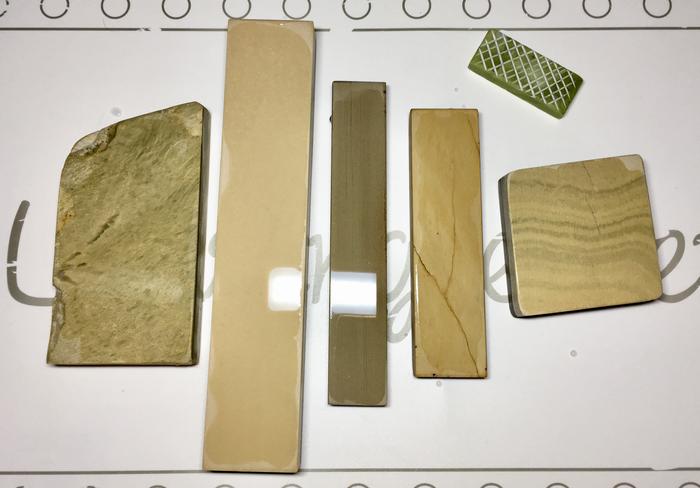
From left to right:
- Lest Latneuses, hybrid side up
- La Veignette
- New grey coticule-BBW combo of unknown veign (any idea?)
- New shallow coticule-BBW combo, i believe its La Dressante
- La Nouvelle Veine
At the top right you can see a small jade slurry stone I have used on the coticules to create a slurry, so that each coticule is working with its own slurry.
For each coticule I've created the slurry of milky conistency and have done some sets of 10xhalf strokes with very light pressure. Didn't count the nr of sets exactly but stoped as I had a feeling that scratches of the previous stone were removed by the current one.
Then I've diluted by dipping the razor into a water glas after a set of halfstrokes. For smaller stones I've done more sets of half strokes, for larger - less. Again, didn't count the strokes but tried to go by feel.
Finaly 50 lightest possible strokes were performed on plain water. After each 10-15 strokes I've flushed the stone with fresh water.
OK, here the edges done with my optical microscop, the pictures are taken with my mobile phone through the objective.
Magnification is 160x.
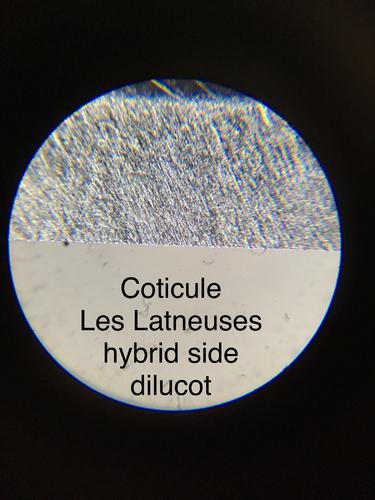
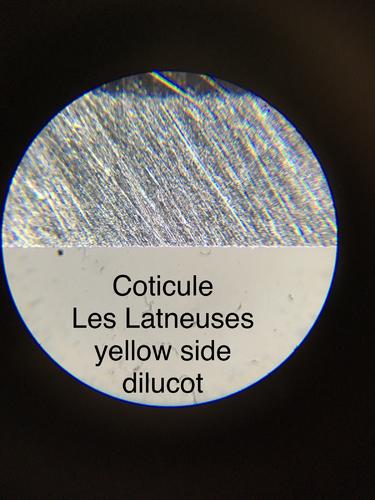
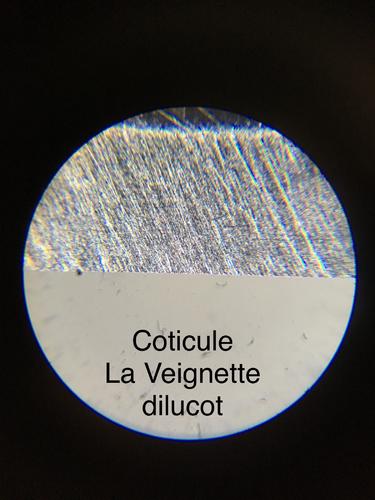
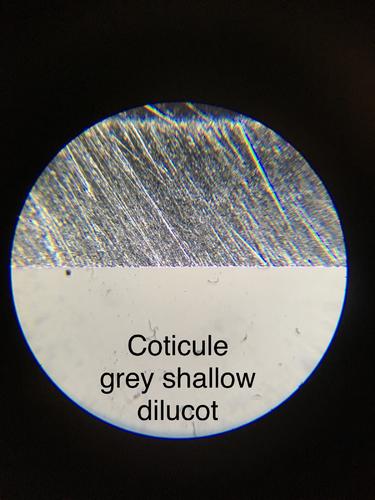
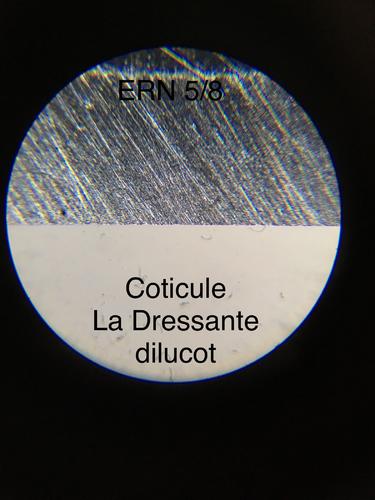
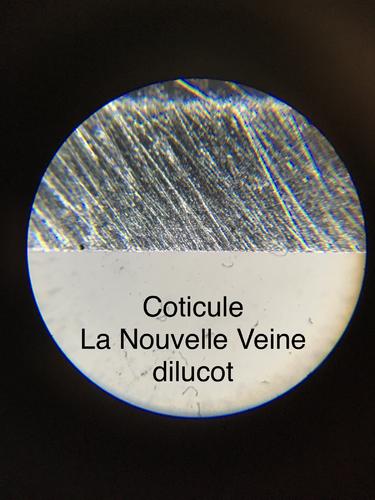
Some points on what I was reading out of the pictures:
- The width of overall scratches at the bevel indicates the size of the garnets somehow (e.g. La Dressante vs. les Lat/yellow).
- Some sporadic larger/deeper scratches may come from released garnets during/after dilution (auto-slurry).
- The brightness of the metal between the striations tells about the poolishing capabilities of on water, the darker the better polishing.
To me "La Nouvelle Veine" is a very good polisher but it releases its large garnets easily which leads to the sporadic deep striations and screw up the edge during the finishing phase.
The best finishing performance (but the slowest speed) was shown by La Dressante.
About the grey shallow I am not sure, it has a quite hard surface and seemed not to autoslurry at all. It even didn't wanted to release much slurry by jade stone so that the DMT card was needed to reach the milky slurry. Perhabs the DMT card has released some bigger chunks of slurry which has produced the deep scratches, I need ot investigate more on that.
Hope the post was of some interest for you.
happy honing
Philipp
-
The Following 4 Users Say Thank You to Philipp78 For This Useful Post:
dinnermint (02-19-2019), Euclid440 (02-02-2019), jfk742 (02-02-2019), ppetresen (02-19-2019)
-
02-02-2019, 04:35 PM #2Senior Member



- Join Date
- Apr 2012
- Location
- Diamond Bar, CA
- Posts
- 6,553
Thanked: 3215
It would be interesting to see what if any difference honing under running water would produce.
Nice work. Have you tried other slurry stones, I have been experimenting with a Translucent Ark slip.
-
02-18-2019, 06:51 PM #3

Fascinating post and very very interesting.
I've read elsewhere that the larger garnets in the La Nouvelle Veine work better with a Unicot approach. It would be interesting to compare edges from this method.
-
02-19-2019, 12:52 AM #4At this point in time...




- Join Date
- Jun 2007
- Location
- North Idaho Redoubt
- Posts
- 27,069
- Blog Entries
- 1
Thanked: 13249
Somewhere on this forum is a picture of a piece of chalk that explains why you have to take Visual Cues with a HUGE grain of salt
It shows the difference in stark contrast of the same surface and the same chalk and only a slight variation of Pressure applied to change the Striations
It is a great visual aid to really think about how much faith you put in micrographs that were produced at such a small minute scale using the infinite inaccuracies of the human hand..
How did the shaves feel
Sure wish I could find that pic for you"No amount of money spent on a Stone can ever replace the value of the time it takes learning to use it properly"
Very Respectfully - Glen
Proprietor - GemStar Custom Razors Honing/Restores/Regrinds Website
-
02-19-2019, 01:27 AM #5
-
02-19-2019, 01:48 AM #6Senior Member



- Join Date
- Apr 2012
- Location
- Diamond Bar, CA
- Posts
- 6,553
Thanked: 3215
It’s an old Seraphim post.
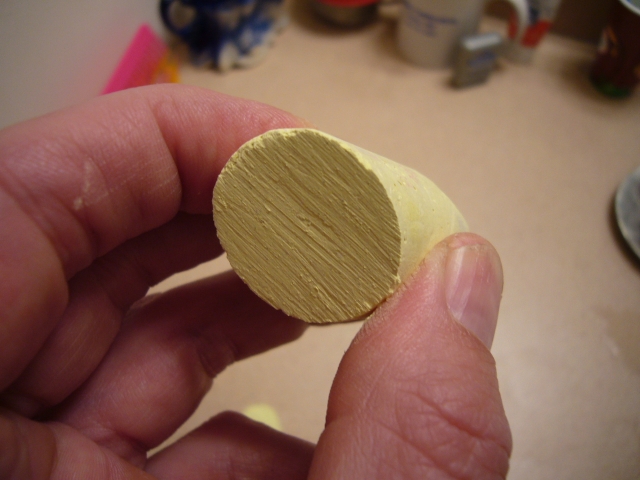
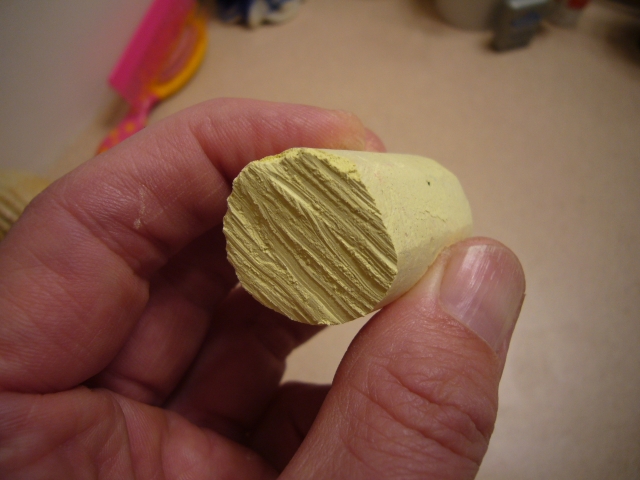
-
02-19-2019, 04:05 AM #7At this point in time...




- Join Date
- Jun 2007
- Location
- North Idaho Redoubt
- Posts
- 27,069
- Blog Entries
- 1
Thanked: 13249
It is a GREAT illustration of what we THINK we see vs what could have caused it
"No amount of money spent on a Stone can ever replace the value of the time it takes learning to use it properly"
Very Respectfully - Glen
Proprietor - GemStar Custom Razors Honing/Restores/Regrinds Website
-
02-19-2019, 09:01 AM #8

Glen - I am sure you are right. The weird thing though is for the two Les Latneuses and the Nouvelle Veine, in my mind that's what I would expect the scratch pattern to look like. - Of course that could be wishful thinking on my part!!
I have a Latneuses with a cream side and a hybrid side. The creamy side cuts fast and leaves a fairly mid sharp but soft edge. The hybrid side is harder and slower and finishes with a much cleaner crisper feel.
My Nouvelle Veine is a puzzle - it is almost like honing on a mid grit stone - except it feels very smooth when I shave. The edge almost feels fluffy - smooth and fluffy!- except when I add the extra bevel with a unicot - then it cleans up well and is really good to use. (Apologies for the bad terminology... )
Of course - as you have said on multiple occasions - no two naturals are the same. I just find the pictures interesting because they kind of make sense to me based on my stones.
-
02-19-2019, 05:24 PM #9Senior Member



- Join Date
- Apr 2012
- Location
- Diamond Bar, CA
- Posts
- 6,553
Thanked: 3215
While I agree that a bevel micrograph is not a predictor of the quality of the edge or its ability to shave, Philipp has a nice collection of vintage Coticules and appears to be a capable honer, by the consistent stria pattern and very straight edges he has posted. It looks like he has been honing for a while.
And I would assume he is trying to produce the best finish from each stone, using the lightest pressure possible to finish, He is even using a non-friable rubbing stone, so the slurry is from the base stone alone.
So, while I do believe that bevel micrographs can be subjective, especially produced by any natural stone, Philipp has taken care to produce consistent results that are a good documentation of the finishes his stones can produce for comparison.
The quality of the micrographs is also impressive, having been taken with a cell phone.
Being naturals and especially being Coticules, one of the most difficult stone to master, based on my experience and that of thousands of others, (a Google search returned 65,000 hits), Phillip’s micrographs are an interesting demonstration of the potential edges these veins can produce.
Philipp’s finding is consistent with what most of us experimenting with naturals have found, harder stone are capable of producing finer stria, more polish and straighter edges.
For me, the Coticule edge is just not keen enough for my taste, and that is exactly what many like about the Coticule.
Philipp, how do the shaves compare?
-
02-20-2019, 07:41 AM #10Senior Member

- Join Date
- Nov 2016
- Location
- Germany
- Posts
- 111
Thanked: 30
Thank a lot,
happy to read all the positive feedback!
Actually I have not yet shaved of all of the coties listed above.
La Nouvelle Vein was my very first stone for razor honing 2 years ago. Looking back I can say it was a bad Idea to start the sharpening journey with a Coticule. I‘ve spent several weeks scrubbing a hell out of the razor and the stone, wondering why the slurry turns that black but the razor does not reach anywhere near to a shaving condition :S
Purchased several other coties and other hones, selled lots of them again, changed razors and so on... until I‘ve started to change the way I‘m honing
The La Nouvelle Vein was laying in a shelf for one year, got it out recently after I‘ve learned to finish on the La Veignette ballancing it on my fingertips.
My facial hair-skin combination seems to require very keen and very smooth edge, below HHT4 I don’t think of test shaving.
La Veignette (fingertips-finished) gives me a very close, effortless and mellow shave with a level of comfort which I would call „as good as my shaving technique“. Shaving was tested with the Filarmonica 14 double temple. Remark: until today I can only get high HHT results of La Veignette by putting another finisher between „working on slurry“ and „finishing“, with classic dilucot I couldn’t exceed the solid HHT3 level yet.
My recently purchased small La Dressante provides higher level of keenness with the same level of comfort, perhabs slightly below (but maybe it was a shaving technique, I‘ve shaved only 2 times of it). And it does not auto slurry! Have not shaved after full dilucot yet, have touched up my Fili 14 on it with water only. It’s definitely my new favorite
Les Latneuses I have also purchased in time I could not properly hone, after some tries and errors it has accompanied the La Nouvelle Vein in the shelf. Will involve it back into my team of „active stones“
The grey one is very new and came together with La Dressante. No experience with it apart of this test.
Currently I‘m occupied by taking care of my damaged PC, but after I plan to spend more time on coties.
Will then also take some unicot pictures, and probably also under running water.
Looking forward to learn more about the „yellow mystery“
Regards
Philipp


 45Likes
45Likes LinkBack URL
LinkBack URL About LinkBacks
About LinkBacks






 Reply With Quote
Reply With Quote
